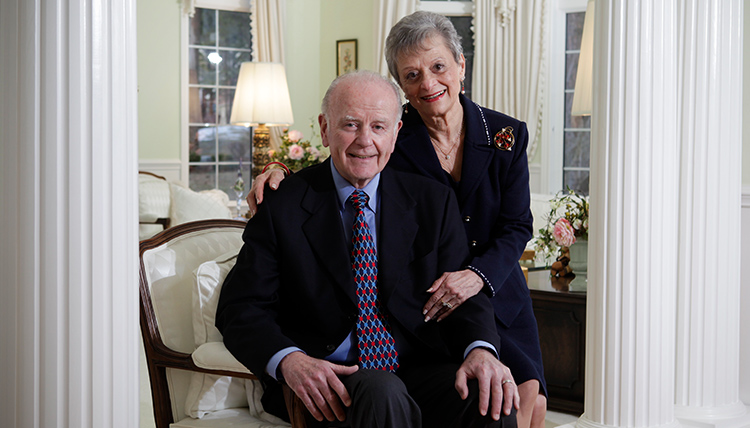Believing it is more blessed to give than to receive, Don and Va Lena Curran have endowed a faculty Chair of Professionalism and Ethics at their alma mater. The purpose of the Chair is to advance teaching and scholarship in the areas of legal ethics and professionalism. The holder of the Chair will be designated the J. Donald and Va Lena Scarpelli Curran Professor of Legal Ethics and Professionalism.
The Currans met in a law school class in 1953 and were married at St. Aloysius Church in 1961. They have three sons, one of whom, Kevin, is a 1988 graduate of the law school.
In 1960, Don co-founded the Spokane law firm now known as Delay, Curran, Thompson, Pontarolo & Walker and limits his practice to plaintiffs’ personal injury and representing lawyers with disciplinary issues. A past president of the Spokane County Bar Association, he is a Fellow in the American College of Trial Lawyers. He has received professionalism awards from the Washington State Young Lawyer Section (1992) and the Spokane County Bar Association (1995). In addition, for over 20 years he has been an invited speaker at seminars on ethics, professionalism, and discipline.
Va Lena is a member of the Washington State Bar Association and has served on the law school Board of Advisors almost since its inception. (As she described it, “I’m the guest who came to dinner and never left.”) She has also served on the Law School Foundation Board. She is presently on the Catholic Charities Board and the Catholic Charities Foundation. She describes one of her “privileges” as cantoring at St. Augustine Church.
Practicing law has been a satisfying experience for both of the Currans. They see lawyers as helping people solve problems and enjoy the challenges of doing so.
The Currans are among the most enthusiastic of Gonzaga supporters. A Trustee of the University for the past 12 years, Don chaired the national search resulting in the 2005 hiring of Earl Martin as dean. Va Lena is a longtime Regent and a past President of the Law School Board of Advisors. The Currans co-chaired the committee to raise funds to construct a new law school building.
“God has been good to us, and we thought we should in some way show our gratitude,” Va Lena said. “Endowing a chair seemed like the thing to do.” The holder of the newly endowed chair will have a faculty member’s regular duties in teaching, academic citizenship, and advising, and is expected to be a leader in professional development. For example, Dean Earl Martin said, the chair holder is expected to participate in seminars and projects with local, state, and national organizations, take an active interest in providing education to the bench and bar, and publish regularly.
The Currans said making the gift was made easy by Dean Martin. “He combines a fine analytical mind and a good legal imagination with a most gentlemanly professional and easy going manner. The legal community has the highest respect for Earl Martin,” Don said. Va Lena joined in saying that in his four years as dean, Earl Martin has hired new and distinguished faculty, developed a rapport with alumni, and significantly increased the bar passage rate, all of which allows graduates to take justifiable pride in their alma mater. “We wanted to be part of the success of Gonzaga Law School in a new and significant way.”
The Currans are private people and wanted no recognition for the gift. However, Dean Martin convinced them that going public would serve the law school’s best interests and even might inspire others to give of their time, talent, and treasure.
Don said the chair will meet a pressing need. “The legal profession is highly regulated with, for example, 61 complex Rules of Professional Conduct with intricate and numerous subdivisions and subparagraphs. Many of a lawyer’s professional responsibilities are prescribed in these rules, as well as substantive and procedural law. However, a lawyer is also guided by personal conscience and the approbation of professional peers. The rules set a mandatory minimum standard of professional behavior. Graduates are schooled in the rules. However, they lack experience in applying the rules to guide them in solving ethical dilemmas. The chair will emphasize, with renewed vigor and technique, the application of ethical principles to real life situations. Memorizing the ethical rules is no assurance of practicing ethically. Learning to use the rules to solve difficult ethical quandaries is the goal we seek.”
With the ethics portion of the bar exam comprising half a day, students are eager to learn the Rules of Professional Conduct. “We invite law students to our home, and often discussion will center on ethics and the pitfalls awaiting the practitioner who has causal deference for the Rules. We urge the students to understand the Rules and seek the advice of seasoned practitioners for advice when in doubt about applying them. For example, how to ethically deal with offensive personalities is not an infrequent issue. The challenge is not to retaliate, which only worsens the problem, but to respond with restraint in a way which discourages repetition. This is professionalism and ethics at their best. To those who say ‘there are too many lawyers’ I have this simple retort: we don’t have too many good lawyers.”
Thanks to help from the Currans, the law school will continue to produce good lawyers!

